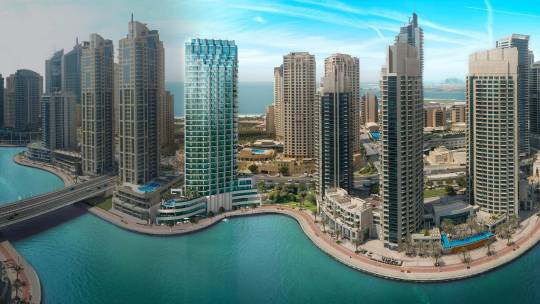Don't wanna be here? Send us removal request.
Text
How to Set Up a Manufacturing Business in a UAE Free Zone

The UAE has long established itself as a global hub for trade, innovation, and business. Its strategic location, investor-friendly policies, and modern infrastructure make it a top choice for entrepreneurs, particularly in the manufacturing sector. Setting up a manufacturing business in a UAE free zone offers numerous benefits, including tax exemptions, 100% foreign ownership, and access to world-class facilities. This guide will walk you through the process of establishing your manufacturing venture in a UAE free zone, with a focus on the steps, benefits, and key considerations.
Why Choose a Free Zone for Your Manufacturing Business?
Free zones in the UAE are specialized economic areas designed to attract foreign investment. They provide an ideal environment for businesses, especially in manufacturing, thanks to:
Tax Incentives: Corporate tax and import/export duties are either minimal or nonexistent.
100% Ownership: No need for a local partner.
State-of-the-Art Facilities: High-quality infrastructure and industrial facilities tailored for manufacturing.
Simplified Regulations: Streamlined business setup procedures.
Strategic Location: Access to international markets via air, sea, and land.
Popular free zones for manufacturing include Dubai Industrial City, Jebel Ali Free Zone (JAFZA), Sharjah Airport International Free Zone (SAIF Zone), and Ras Al Khaimah Economic Zone (RAKEZ).
Steps to Set Up a Manufacturing Business in a UAE Free Zone
1. Research and Choose the Right Free Zone
Different free zones cater to specific industries. For instance, JAFZA and Dubai Industrial City are ideal for large-scale manufacturing due to their advanced logistics and proximity to major ports. Evaluate your business requirements and choose a free zone that aligns with your manufacturing needs.
2. Define Your Business Activity
Determine the type of manufacturing you will engage in. This is critical as free zones have specific licenses for different activities. For example, you may require an industrial license if you plan to produce goods or an operational trade license in Dubai for trading manufactured products.
3. Develop a Comprehensive Business Plan
A well-drafted business plan is crucial for obtaining approvals from the free zone authority. It should include:
Nature of your business.
Target market.
Production capacity.
Financial projections.
Equipment and machinery requirements.
4. Secure Initial Approvals
Submit an application to the chosen free zone authority for initial approval. This usually involves providing basic details about your company and its activities.
5. Obtain a Trade License Dubai
A trade license is mandatory for legal operations in any UAE free zone. The type of license you require will depend on your manufacturing activity. The process typically includes:
Submitting a license application form.
Providing your business plan and activity details.
Paying the applicable fees.
The trade license is issued quickly in most free zones, ensuring minimal delays.
6. Lease a Manufacturing Facility
Free zones offer a range of facilities, from warehouses to industrial units. Leasing a facility involves:
Choosing a unit that meets your production requirements.
Signing a lease agreement with the free zone authority.
Ensuring the facility adheres to safety and environmental standards.
7. Set Up Your Manufacturing Unit
Install machinery and equipment in compliance with UAE standards. The free zone authority may conduct inspections to ensure safety regulations are met.
8. Open a Corporate Bank Account
After obtaining your trade license and other approvals, open a business bank account in the UAE. Choose a bank that aligns with your transaction and financial needs.
9. Hire Employees and Apply for Visas
Most free zones provide visa quotas based on the size of your facility and business. Follow these steps:
Apply for employee visas through the free zone’s immigration portal.
Obtain work permits and medical clearances for your staff.
Familiarize yourself with UAE labor laws to ensure compliance.
10. Begin Operations
Once all approvals are in place and your facility is operational, you can begin manufacturing. Free zones often provide networking opportunities and support to help businesses grow.
Key Considerations for a Manufacturing Business in the UAE Free Zone
1. Environmental and Safety Compliance
Manufacturing businesses must adhere to strict environmental and safety regulations. Ensure your processes and waste management systems meet the required standards.
2. Supply Chain and Logistics
Leverage the UAE’s advanced logistics infrastructure to optimize supply chain operations. Free zones often provide easy access to ports, airports, and highways, making it convenient to import raw materials and export finished products.
3. Cost Management
While free zones offer several cost benefits, it's essential to manage operational expenses, including facility rental, utilities, and labor costs.
4. Market Access
The UAE’s location provides easy access to markets in the Middle East, Africa, and Asia. Utilize free trade agreements to expand your market reach.
5. Local Partnerships
Although you can fully own your business in a free zone, forming partnerships with local suppliers and distributors can enhance your operational efficiency and market penetration.
Benefits of Setting Up a Manufacturing Business in a Free Zone
100% Repatriation of Profits: Enjoy full control over your earnings.
Ease of Setup: Streamlined procedures ensure quick and hassle-free establishment.
Global Connectivity: Benefit from the UAE’s extensive trade network.
Innovation Ecosystem: Free zones like Dubai Industrial City provide access to advanced technology and R&D facilities.
Brand Credibility: Operating in a UAE free zone boosts your brand’s reputation in the global market.
Conclusion
Setting up a manufacturing business in a UAE free zone is a strategic decision that offers a wealth of opportunities. From tax incentives to cutting-edge infrastructure, the benefits are unmatched. However, thorough planning, compliance with regulations, and choosing the right free zone are critical to success.
With the right strategy and support, your manufacturing business can thrive in one of the world’s most dynamic business hubs. Whether you’re producing consumer goods or industrial equipment, securing the appropriate trade license Dubai is the first step toward realizing your vision.
Start today, and tap into the limitless potential of the UAE free zones to transform your manufacturing business into a global powerhouse.
1 note
·
View note